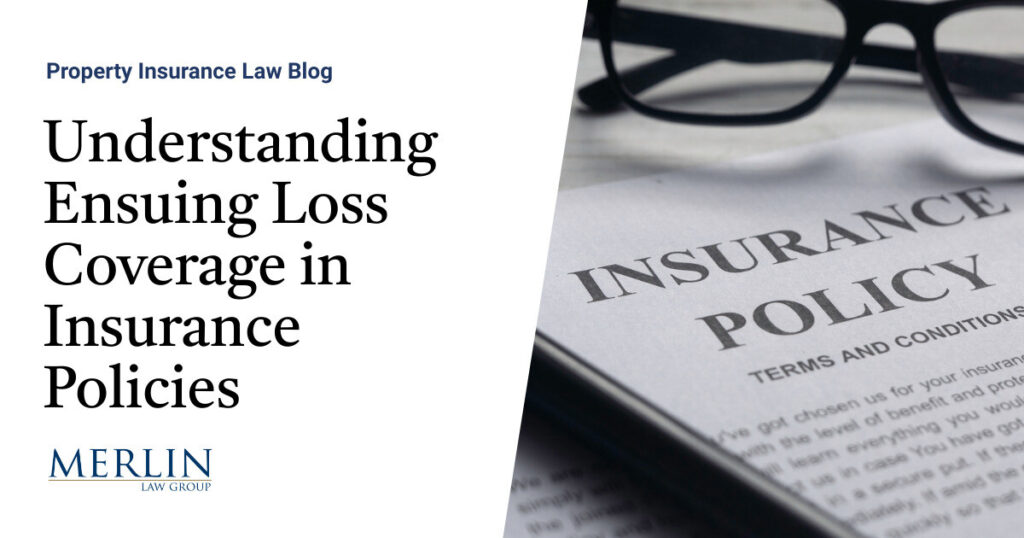Understanding Ensuing Loss Coverage in Insurance Policies

Today, I want to delve into the topic of Ensuing Loss Coverage in insurance policies. With hurricane season upon us, understanding this concept is crucial, as many homeowners may face ensuing losses after a primary loss event. There seems to be some misinformation circulating about this topic, so I’d like to clarify a few key points. Remember, always consult with an attorney in your state to understand specific legal implications. Not every state is the same.
What is Ensuing Loss?
The term “ensuing” means “to take place afterward or as a result.” In the context of insurance, ensuing loss refers to damages that occur as a result of a covered peril following an excluded peril. It’s important to note that ensuing loss is distinct from Concurrent Causation, which I may cover in a future post.
Many insurance adjusters may misinterpret ensuing loss provisions, potentially leading to claim denials. An ensuing loss provision in an insurance policy covers damages to other parts of the property that are separate from the initial excluded loss. The U.S. Court of Appeals for the Sixth Circuit highlights two purposes of an ensuing loss clause: 1
The clause reaffirms “that what is not excluded is covered.”
The clause “establishes that chronologically later-in-time damages caused by a peril not otherwise excluded remain covered.”
Legal Precedents
In Homeowners Choice Property & Casualty v. Maspons, 2 the Third District Court of Appeal in Florida stated that if a consequential or “ensuing” loss is not excluded under another provision of the policy, it is covered. The insured must demonstrate damage that is separate from the excluded cause of loss. Even if the initial cause of loss is excluded, ensuing loss coverage protects subsequent damages resulting from a covered peril. 3
Ensuing Loss Clauses in Action
Ensuing loss clauses can vary in form. One example reads: “We do not insure for loss to property described in [applicable coverage] caused by any of the following. However, any ensuing loss to property described in [applicable coverage] not excluded or excepted in this policy is covered.” Another variation states: “In the event an excluded cause of loss results in a covered cause of loss, the company will be liable only for such resulting loss or damage” 4 In the latter, notice how the word “ensuing” is never mentioned? Policyholder representatives must be able to recognize this language when reading a policy in order to apply coverages properly. Learning how to identify ensuing loss language is key.
Real-World Scenario
Consider a scenario where a homeowner’s roof leaks, causing rainwater to damage the interior walls and floor of the house. The insurer might deny the claim, citing that the leak was due to faulty workmanship, which is an excluded peril. Insurers often argue that if an excluded peril contributed to the loss, the claim is not covered. However, the homeowner’s claim focuses on the rainwater damage, a result of a covered peril—rain.
In this situation, the ensuing loss clause is crucial. The question becomes whether the damage ensued from a covered peril. If it did, then the claim should be covered, even if excluded perils were involved in the chain of events. 5
Conclusion
Understanding ensuing loss coverage is vital for homeowners and insurance professionals alike, especially during hurricane season. I hope this explanation clarifies the topic and assists you in helping policyholders secure the coverage they deserve. Always consult with a local attorney to understand how ensuing loss clauses are applied in your state.
1 TMW Enters., Inc. v. Federal Ins. Co., 619 F.3d 574, 577-79 (6th Cir. 2010).
2 Homeowners Choice Prop. & Cas. v. Maspons, 211 So.3d 1067 (Fla. 3d DCA 2017).
3 The Bartram, LLC v. Landmark Am. Ins. Co., 864 F. Supp. 2d 1229, 1233, (N.D. Fla. 2012).
4 Robinson+Cole, Archives: Ensuing Loss.
5 Chris French. The “Ensuing Loss” Clause in Insurance Policies: The Forgotten and Misunderstood Antidote to Anti-Concurrent Causation Exclusions. Nevada Law Journal Vol. 13 (2012). Available at: http://works.bepress.com/chris_french/6/







